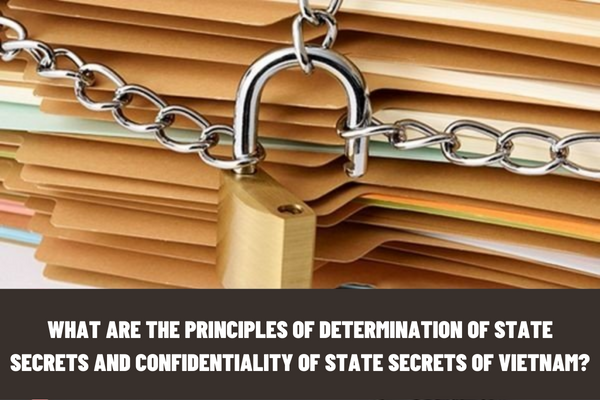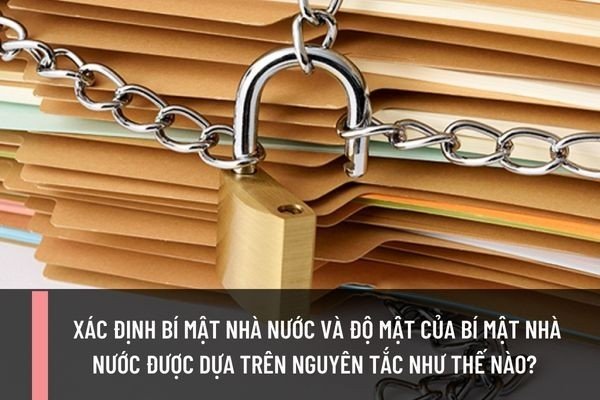What are the principles of determination of state secrets and confidentiality of state secrets of Vietnam?
- What are the principles of determination of state secrets and confidentiality of state secrets of Vietnam?
- Who has the authority to carry out duplication and photographing of state secret containers classified as “top secret”?
- What are the regulations on equipment and devices used for duplication and photographing of state secret containers of Vietnam?
What are the principles of determination of state secrets and confidentiality of state secrets of Vietnam?
Pursuant to the provisions of Article 10 of the 2018 Law on Protection of State Secrets of Vietnam stipulating as follows:
Determination of state secrets and confidentiality of state secrets
1. State secrets and confidentiality thereof must be determined according to state secrets lists and regulations of this Law.
2. Heads of regulatory bodies and organizations shall determine state secrets, confidentiality thereof, scope of distribution and whether duplication or photographing of containers of such state secrets is permitted. When a state secret of another regulatory body or organization is used, its confidentiality level must be determined as appropriate. If different pieces of information in the container of a state secret included in a state secret list have different confidentiality levels, the highest level shall prevail.
3. Confidentiality of state secrets shall be denoted by confidentiality markings, confidentiality notices or in other forms suitable to state secret containers.
4. The Government shall elaborate this Article.
According to the above provisions, the state secrets and confidentiality thereof must be determined according to state secrets lists and the above-said regulations.

What are the principles of determination of state secrets and confidentiality of state secrets of Vietnam? (Image from the Internet)
Who has the authority to carry out duplication and photographing of state secret containers classified as “top secret”?
Pursuant to Clause 1, Article 11 of the 2018 Law on Protection of State Secrets of Vietnam, the persons with competence in granting permission for duplication and photographing of state secret containers classified as “top secret” include:
- Heads of central organizations of the Communist Party; heads of affiliates of the Central Steering Committee of the Communist Party;
- Heads of organizations of the National Assembly and affiliates of the Standing Committee of the National Assembly; the Secretary General of the National Assembly - Chief of Office of the National Assembly;
- Chief of Office of the President;
- Chief Justice of the Supreme People’s Court, Chief Prosecutor of the Supreme People’s Procuracy;
- State Auditor General;
- Chief Justices of Superior People’s Courts, Chief Justices of provincial People’s Courts, Chief Prosecutors of Superior People’s Procuracies, and Chief Prosecutors of provincial People’s Procuracies;
- Heads of central bodies of socio-political organizations;
- Ministers and heads of Ministerial-level agencies;
- Heads of Governmental agencies;
- Secretaries of Party Executive Committees of provinces and cities and Head of Delegation of the National Assembly Deputies, Chairpersons of People's Councils, Chairpersons of People's Committees of provinces and central-affiliated cities;
- Superiors of the persons specified in Points a, b, c, h and i Clause 1 Article 11 of the 2018 Law on Protection of State Secrets of Vietnam;
- Heads of Office of the State Audit Office, affiliates of the State Audit Office, specialized State Audit Offices and regional State Audit Offices;
- Heads of affiliates of the bodies specified in Points a, b, c, d, dd, g and h Clause 1 Article 11 of the 2018 Law on Protection of State Secrets of Vietnam, excluding heads of public service providers;
- Heads of overseas representative missions of the Socialist Republic of Vietnam.
What are the regulations on equipment and devices used for duplication and photographing of state secret containers of Vietnam?
Pursuant to the provisions of Article 3 of Decree No. 26/2020/ND-CP stipulating means and equipment used to copy and photograph documents and containers containing state secrets as follows:
Duplication and photographing of state secret containers of Vietnam
1. Reproduction of a document containing a state secret means copying or making another copy based on the exact contents of the original or authentic copy of the document. Photographing of a state secret container means taking a photograph of the state secret container.
A document containing a state secret may be reproduced as a certified true copy, a copy of a certified true copy or an extract.
2. A state secret container must be reproduced and/or photographed at a safe location designated by the head of the regulatory body or organization directly managing the state secret. Such reproduction and photographing must be recorded into books for management of state secret reproduction and photographing.
3. Copies of documents containing state secrets must bear marks denoting that they are copies; photocopies of state secret containers must have photographing records. Copies and photocopies shall be made in permitted amount and excess or damaged copies shall be disposed of immediately. A copy or photocopy made in accordance with regulations in this Decree shall have the same legal value as its authentic copy and must be protected as if it were the original copy.
4. State secret containers shall be copied and photographed using only equipment and devices that cannot be connected to the Internet, computer networks or telecommunications networks, unless otherwise provided for by regulations of laws on cryptography.
5. Confidential telegrams shall be copied and photographed in compliance with regulations of laws on cryptography.
6. Minister of Public Security shall stipulate specimen marks denoting copies of state secret containers, specimen photographing records and specimen books for management of state secret reproduction and photographing.
Thus, state secret containers shall be copied and photographed using only equipment and devices that cannot be connected to the Internet, computer networks or telecommunications networks, unless otherwise provided for by regulations of laws on cryptography.
LawNet
